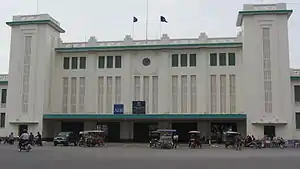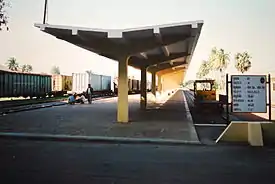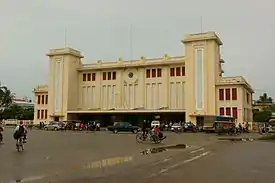Royal railway station (Phnom Penh)
Phnom Penh Royal railway station (French: Gare de Phnom Penh) is a railway station in Phnom Penh, Cambodia. It is located next to the University of Health Sciences and the National University of Management as well as the Canadian embassy. As of February 2014, the station was only used for sporadic goods transport, chiefly oil-tank trains. This station was renovated and formally reopened October 22, 2010.
Phnom Penh Royal railway station | |
|---|---|
 Phnom Penh railway station Refurbished 2012 | |
| Location | Phnom Penh, Cambodia. |
| Coordinates | 11°34′21″N 104°55′00″E |
| Platforms | 2 |
| Construction | |
| Parking | Available |
| History | |
| Opened | 1932 |
| Rebuilt | 2010 (Renovation) |
| Electrified | no |
| Passengers | |
| 0 | |
| 0 | |


Scheduled passenger train services between Phnom Penh and Sihanoukville resumed in May 2016 after having been suspended for 14 years.[1][2] The line between the Thai border at Poipet and Battambang was under reconstruction as of 2017, with the remainder of the line between Battambang and Phnom Penh planned to be reconstructed at a cost of $150 million.[3]

In April 2018, trains operated by Royal Railway began running express from Phnom Penh International Airport to Phnom Penh railway station. As of 2019, Royal Railway runs 44 trains each day, and 15–16 freight trains to Sihanoukville and Poipet.
Construction
The process of building the station was hampered by the rainy season. "A considerable advance was thus taken during the first year and, in 1931, the Company concentrated all her effort on the one hand on the Phnom Penh train station, including embankments, buildings and facilities, which are of an exceptional importance, and secondly on ballast supplies. Meanwhile, nature, so often hostile in Cambodia, became the main auxiliary against the engineers by packing embankments and consolidating them with vegetation. Good weather having returned, work actively resumed with the rehabilitation of the embankments and the levelling of the platform."[4]
The station was built in 1932 from reinforced concrete[5] to service the railway to Battambang.
History
On September 28–30, 1960, twenty-one leaders of the Kampuchean People's Revolutionary Party (KPRP) held a secret congress at the station.[6][7] The meeting resulted in the party being renamed as the Workers Party of Kampuchea (WPK). In Democratic Kampuchea, this pivotal meeting would later be projected as the founding date of the party.[8] The first important meeting of the Khmer Rouge leadership including Pol Pot was held at the railway station in April 1975, following the fall of Phnom Penh at which the decision to evacuate the cities was taken.[9][10]
See also
Notes
- Osborne, Milton E. (2008). Phnom Penh: a cultural and literary history. Signal Books. ISBN 978-1-904955-40-5.
References
- Maierbrugger, Arno. "Passenger trains revived in Cambodia after 14-year-hiatus | Investvine". Investvine. Retrieved 2021-01-29.
- Peter Ford (5 June 2016). "Cambodia revives train service between Phnom Penh and Sihanoukville". The Guardian. Retrieved 2021-01-29.
- Siv Meng (12 January 2017). "Poipet railway works face setbacks". Retrieved 2021-01-29.
- "Le chemin de fer de Phnom-Penh à Mongkol-Borey" [The Railway from Phnom-Penh to Mongkol-Borey]. L'Éveil économique de l'Indochine : bulletin hebdomadaire (in French) (749 ed.). Saigon. August 7, 1932. Retrieved August 7, 2016.
- "INFORMATION FOR VISITORS". National Museum of Cambodia. Retrieved 4 February 2011.
- Osborne, p. 124
- Chronologie du Cambodge de 1960 à 1990
- Chandler, David P., Revising the Past in Democratic Kampuchea: When Was the Birthday of the Party?: Notes and Comments, in Pacific Affairs, Vol. 56, No. 2 (Summer, 1983), pp. 288-300.
- Osborne, p. 149
- Sheridan, Michael (2004-10-24). "War: Pol Pot by Philip Short". The Times. Retrieved 5 February 2011.
External links
| Wikimedia Commons has media related to Phnom Penh train station. |
- Wikimapia: Phnom Penh train station
- Cambodia Train Schedule]